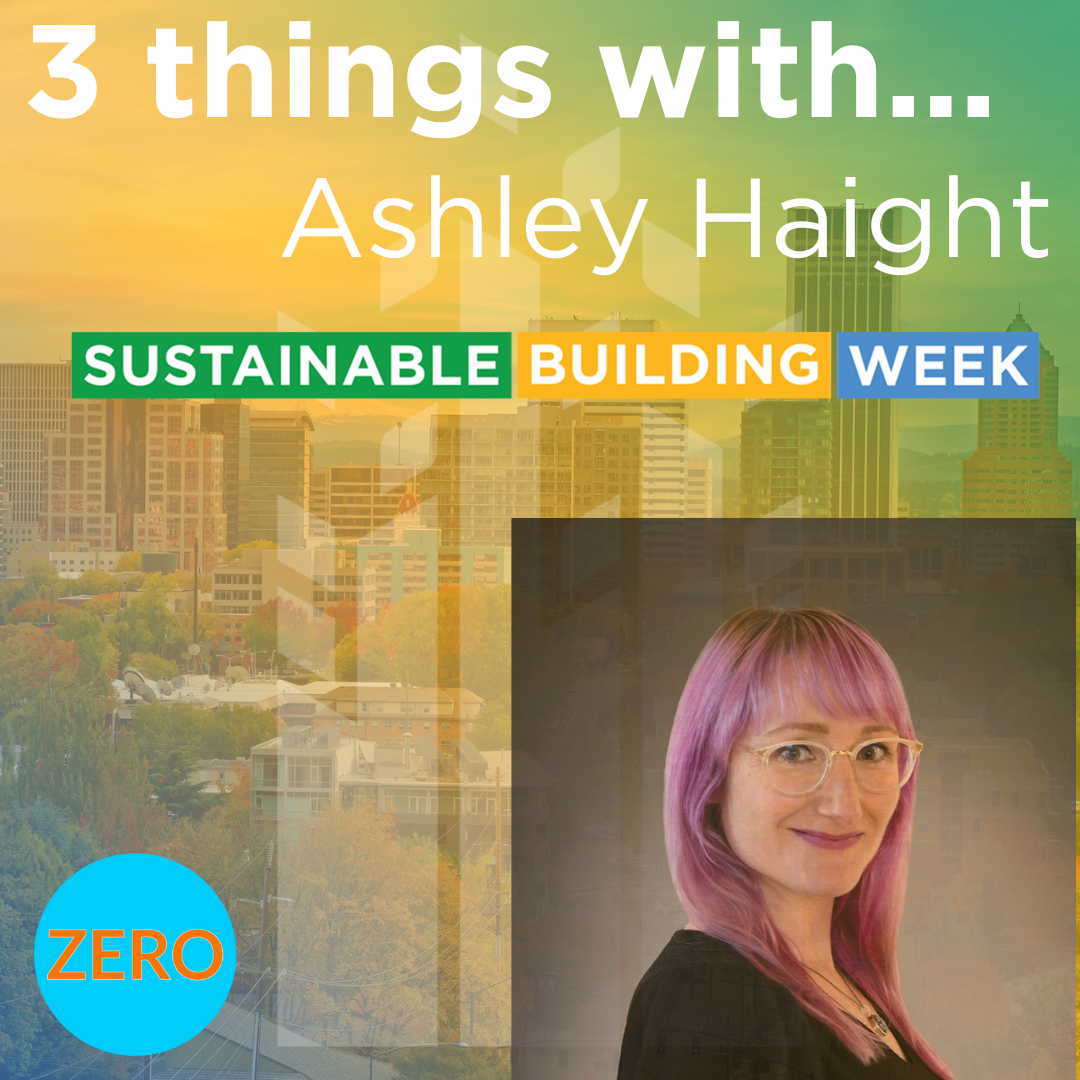3 Things With … Ashley Haight

3 Things With … Ashley Haight
Portland has an amazing sustainability community and we want to highlight the amazing people and work that shapes our unique city. We’re sharing their answers to questions we posed.
Meet ZERO Coalition Manager Ashley Haight. She has a decade of experience in energy efficiency program management in the built environment. As part of ZERO’s solution-oriented team, she works with members to accelerate equitable, sustainable policy change to decarbonize the built environment and meet Oregon’s climate obligations. As Co-chair of the Governance & Steering Committee, she was instrumental in centering the coalition’s mission on equity.
Take it away, Ashley!
What does sustainable mean to you?
Sustainability is a call to action. It means considering the impact our actions have on the environment and all living beings. In design, sustainability is about pushing boundaries and creating innovative solutions that enhance our relationship with our surroundings. We must be mindful of embodied carbon in building materials we use, from their production to transportation to building sites. A sustainable future will be possible when we learn from past mistakes and acknowledge the harm caused by materials like plastic which can take hundreds of years to degrade and end up in the ocean and in our bodies as microplastics. It’s important to consider who is being affected by pollution and who has access to healthy, sustainable spaces. Frontline communities are often the first and worst impacted by climate change as gentrification and displacement have pushed their communities next to the most pollution and lack of tree canopies which creates deadly heat islands. Just like being anti-racist, being sustainable requires us to take action and make conscious choices that align with our principles. We cannot simply claim to value sustainability without putting it into practice.
Name a Portland (or Oregon) project or collaboration that has inspired you, and tell us why you are inspired by it.
I’m deeply impressed by the AlbinaOne project of Albina Vision Trust, which strives for environmental justice. The project aims to revitalize the inner N/NE Portland area and provide affordable housing to 94 families, particularly Black Portlanders who were previously displaced from the neighborhood due to urban renewal, freeway siting, and gentrification. This initiative seeks to address the intentional displacement of Black people from the area and facilitate their return to the community. Residents will benefit from culturally specific education, career placement support, employment training, mentoring, and other supportive services.
I think sustainability comes in many forms and is most powerful when created in community. Albina Vision is creating safe, healthy, affordable homes for the Black community to thrive and have access to green spaces and brighter futures.
It’s the first project in the 50-year Albina Vision that will be designed to create and sustain their vision to build spaces that make living in Portland and building generational wealth sustainable for Black families. As they say, “…environmental stewardship will continue to be key to the Albina Vision. Environmental justice is racial justice.”
What can Portland (or Oregon) be doing better to be more sustainable?
To move away from our extractive economy and unbridled capitalist growth, we must relearn how to live in harmony with the earth. This requires investing more time and resources in accelerating existing solutions and creating new ones. To make Portland more sustainable, we should stop allowing coal trains to pass through, prioritize building bike lanes over larger freeways, and focus on constructing and retrofitting resilient, equitable, healthy, and energy-efficient homes and buildings. We need to eliminate wasteful practices, toxic materials, and dirty energy sources. Energy efficiency must come first, which means constructing or retrofitting homes and buildings with air-sealing and insulation and selecting highly efficient appliances, triple-pane windows, and efficient heating, cooling, and water heating. Once a building is highly energy-efficient, the amount of renewable energy it needs to become zero energy or net zero is much less than adding renewables to an inefficient building that wastes energy. The ZERO Coalition created some resources to help designers and builders navigate the steps to zero energy for retrofits and new buildings, check them out to learn more.
Clean energy should be a priority, focusing on renewable sources and electrification. We should also learn from indigenous cultures and traditions on how to function as a holistic community, building microgrids and community solar, sharing electric vehicles, growing our own food, and using natural materials. While personal responsibility is important, corporations and governments must also be held accountable for their role in the climate crisis. Resources must be distributed equitably to facilitate a just transition away from harmful fossil fuels. Fortunately, with the passing of the Climate Resilience Package of bills and funding from the Inflation Reduction Act (IRA), we have the momentum to turn these ideas into action.
Recent News
September 19, 2023
September 15, 2023
August 16, 2023
Stay in the Know!
© 2024 Sustainable Building Week. Website by Triple Play Studio


